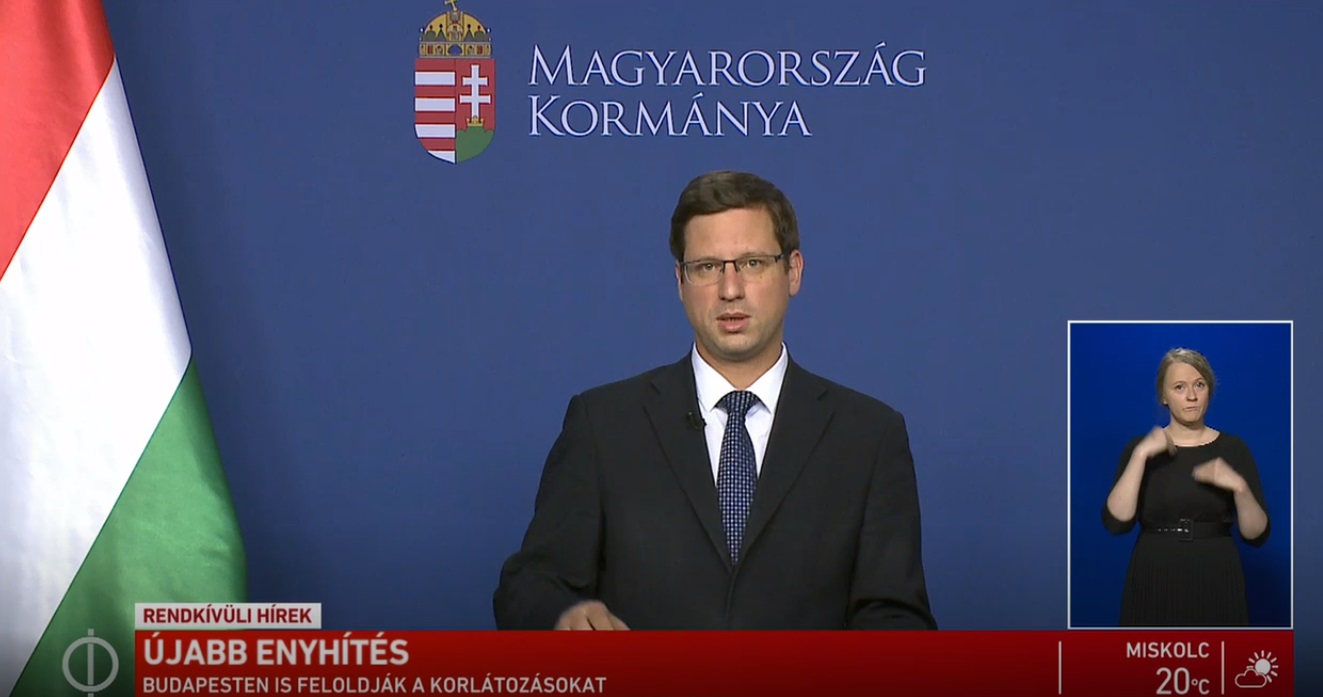Asylum seekers released from transit zones after ruling by European court
The Hungarian government will scrap its so-called transit zones on the southern border with Serbia, releasing hundreds of asylum seekers being held there, the prime minister's chief of staff Gergely Gulyás announced at a press conference in Budapest on Thursday.
The decision came after the European Court of Justice (ECJ) ruled last week that holding migrants in the tranzit zones was illegal. Hungary's holding of the asylum seekers amounted to unlawful detention, the court found, since "the persons concerned cannot lawfully leave that zone of their own free will in any direction whatsoever".
"The Hungarian government disagrees with the ruling, we consider it a risk with regard to European security, but as an EU member state, we will adhere to all court rulings," Gulyás said at the press conference.
The case was brought to the ECJ after Hungarian judges asked the court to rule on whether placement in the country’s two land-border transit zones constitutes detention. Asylum applications of migrants detained there had been denied by Hungarian authorities, who argued they had entered the country illegally through Serbia, which Hungary considers a safe transit country.
But Serbia refused to take back the migrants, saying it had no agreement with Hungary on the transfer of those who illegally enter an EU country. The asylum seekers therefore could not proceed in any direction, and were compelled to remain in the barbed wire-enclosed tranzit zones after Hungary refused to re-evaluate their asylum claims.
The Hungarian Helsinki Committee, which legally represented the two families of asylum seekers who were plaintiffs in the case, announced on Thursday that some 280 asylum seekers being held in the tranzit zones had been released and escorted to open or semi-open reception centers. The plaintiff families had been detained for 464 and 526 days.
"As a result of our persistent legal work in the interests of our clients, decisions by the Hungarian and Luxembourg courts finally ruled that the Hungarian government's asylum regulations are incompatible with EU law. We have succeeded in ending the illegal harassment of hundreds of people, including many families with children and single women," the Helsinki Committee wrote.
Since August of 2018, the European Court of Human Rights has called on Hungarian authorities to provide food to those detained in the transit zones on at least 24 separate occasions, according to the Helsinki Committee. The transit zones have been criticized for their "prison-like conditions", which Amnesty International described as "filthy" and "overcrowded".
Following last week's ECJ decision, Justice Minister Judit Varga told Hungary's news wire that Hungarian regulations and practices are in line with EU and international law, since "migrants could have left the transit zone to Serbia at any time". Varga said the ruling signals that "they want to require Hungary to receive and accept immigrants without controls", and that the government will examine the legal situation and its consequences from a constitutional point of view.
In a radio interview on Friday, Prime Minister Viktor Orbán said that the court's decision shows that "the Brussels bureaucrats have awakened", and that "the historic debate on migration has been revived". Asylum seekers must now submit their applications at the Hungarian embassy in Belgrade and wait in Serbia until Hungarian authorities reach a decision, he said, adding that this system is worse for migrants than being detained in transit zones.
"The Brussels bureaucrats are sitting in the pocket of someone named George Soros," Orbán said.
Government will submit proposal on ending rule by decree
The government will submit a proposal to Parliament on Tuesday on suspending the government's powers to rule by decree, the prime minister's chief of staff Gergely Gulyás said at a press conference on Thursday.

If circumstances of the pandemic demand it, the special legal order could be reintroduced, he said, adding that "we wouldn't like that".
The assembly could vote on the proposal in June, Gulyás said.
Some reports suggested that the proposal will include the suspension of Hungary's state of emergency, which has been in place since March 11, while others indicated the proposal would only retract the government's authority to pass legislation by decree without going through parliamentary procedures, which it has had since March 30. We will update this article as the details become clear.
Parliament approves omnibus bill ending legal recognition of transgender people
A package of new legislation was adopted by the Fidesz-KDNP supermajority in Parliament on Tuesday, including a law which makes it impossible for transgender people to legally change their gender in public records.
The new legislation stipulates that the "biological sex" of a person shall be defined by the chromosomes they were born with, precluding the opportunity for transgender people to petition the state to legally change their genders or their names.
The changes were condemned by civil organizations, psychologists and MEPs. A researcher for Amnesty International said the law "sends Hungary back to the dark ages" and will result in increased discrimination against trans people and stoke hostility against the LGBTQ community.
Among the other legislation passed on Tuesday:
- details of the contracts for building the new Budapest-Belgrade railway will be classified for a period of ten years
- digital surveillance powers will be expanded for the Special Service for National Security
- workers in the cultural sector will lose their status as public employees
- those employed in the public work scheme can be suspended from the program for three months if they do not keep their homes tidy
- six additional public universities, following the model of Corvinus University, will now be funded by foundations.
State funding for Democratic Coalition suspended
The State Audit Office (ÁSZ) has suspended budgetary funding for opposition party Democratic Coalition (DK) until the party can prove its finances comply with regulations, the office announced on Thursday.
The state auditor found irregularities in the party's financial statements from 2017-2018, including unreliable data on revenues and expenditures, said ÁSZ secretary general Magdolna Holman.
DK president Ferenc Gyurcsány has been informed of what documents the party must supply to prove the restoration of its proper financial management, after which the suspension will be lifted, she said.
DK argues that the auditor is requesting original documents that were destroyed in a fire at its headquarters in 2018. But Holman contends that ÁSZ is not requesting any documents that were destroyed, but requiring that DK "prove its legal operation using current documents". The party has not demonstrated that it has operated exclusively from legally authorized sources and that it has not received prohibited financing, she said.
The party accused ÁSZ of "executing a task it received from Viktor Orbán", and said in a statement that the party would continue operating "regardless of what Fidesz-occupied party state organizations do".



